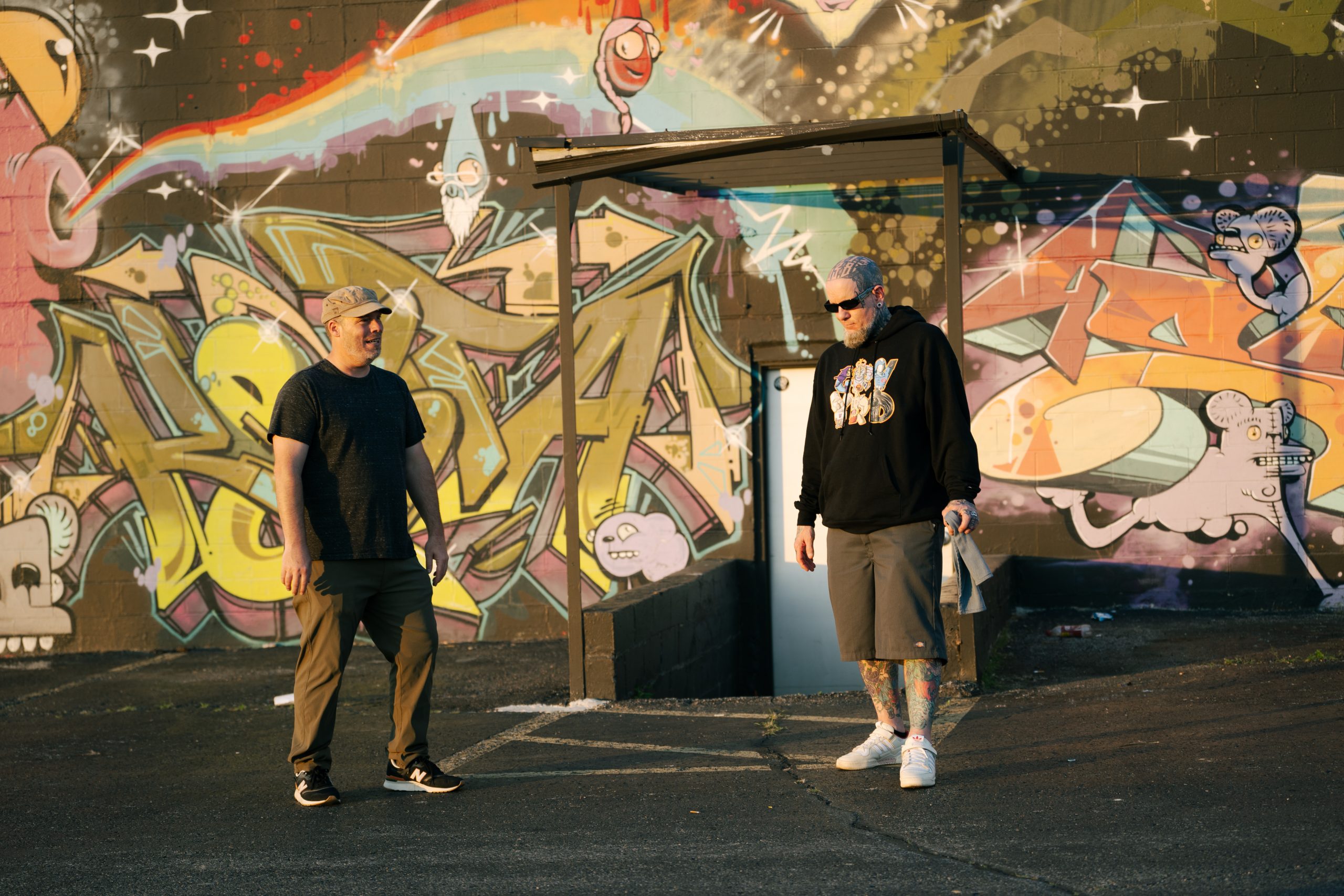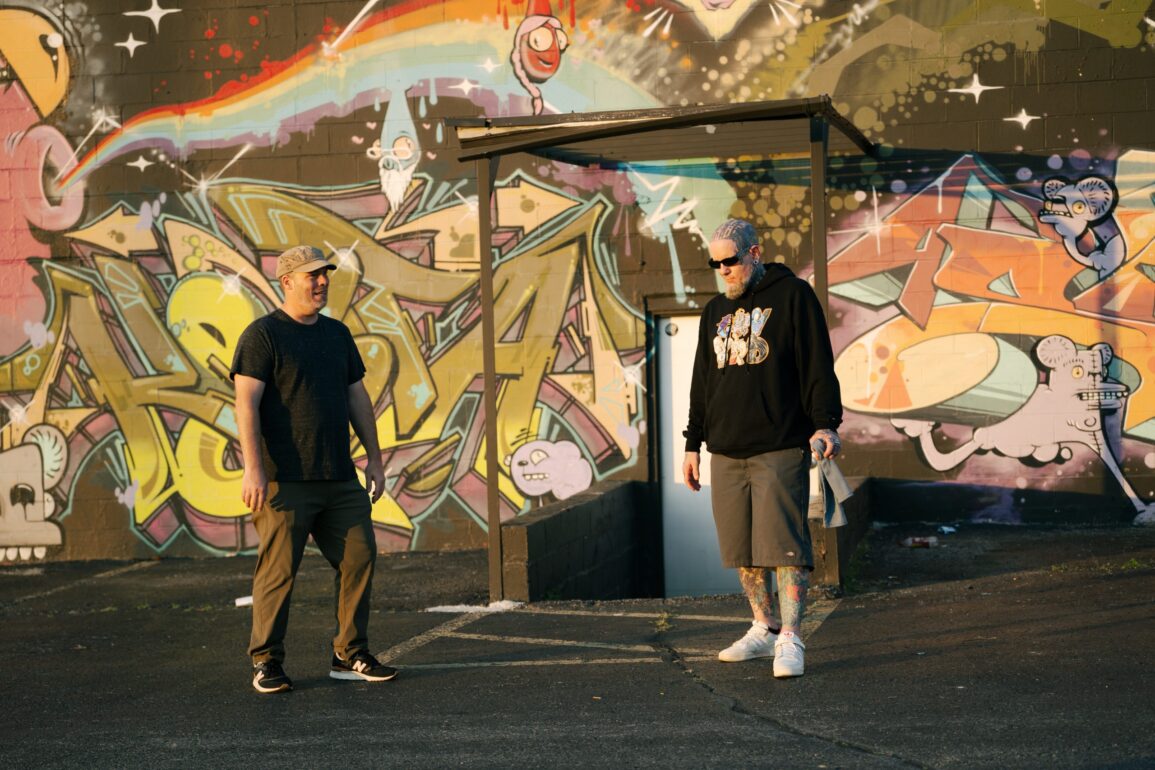
PHOTOGRAPHY BY ABIGAIL SPEARS
The Queen City may no longer be known for hosting what was once dubbed as “America’s largest hip hop festival,” but two burgeoning filmmakers studying at the University of Cincinnati hope to change that with a Scribble Jam documentary.
While 22-year-old Tyler Brune and 23-year-old Jacob Leitner never experienced the legendary summer festival that mainly took place at a local nightclub called Annie’s (with additional events at Top Cats and Burnet Woods) from 1997 to 2008, they and a crew of eight filmmakers plan to release Scribble Jam: The Documentary in next fall. The subject became their passion project after Brune learned about it from one of his media production professors.
“I’ve always been super interested in documentary filmmaking, especially things that are in the Cincinnati area that can bring light to cool stuff around here,” says Brune, who serves as the documentary’s director. “When I heard about it, I thought it immediately popped out as just a great idea for a documentary film.”
Scribble Jam: The Documentary explores how a low-profile party in Annie’s parking lot to celebrate the March 1996 launch of Scribble Magazine—a graffiti art publication founded by fellow graf-writers “Fat Nick” Accurso and Jason Brunson—later evolved into a world-class festival with corporate sponsorships, hefty cash prizes for battle winners, and headlining performances from artists like Masta Ace, Atmosphere, KRS-One, Big Daddy Kane, and Brother Ali.
According to the documentary’s GoFundMe fundraiser page, the Scribble Jam story will be told in three parts: Cincinnati hip hop, Scribble’s founders, and the festival’s history.
“We’re still in the production phase right now, so we still have a couple more interviews left, but we are very big on telling the story the right way,” says Leitner, the film’s producer.
Spending two years learning about a festival that existed a generation ago, Brune and Leitner fell deep into rabbit holes discovering hip hop culture’s nuances.
“Going into it, I was as much of a hip hop fan as anyone else, but I didn’t really know all about the elements of hip hop and the whole culture and how it all correlates into one thing,” Brune says.
Having that context helped them begin to unpack Scribble Jam’s significant role as a tool of cultural preservation. For one, the festival happened during a time when rap music had become more commercially accepted than ever, and it captured an audience who appreciated hip hop’s foundational years when all the elements coexisted.
Additionally, Scribble Jam peaked during a momentous time where scenes in Midwestern cities like Detroit, Chicago, Minneapolis, Indianapolis, and Cincinnati were building national followings. Independent labels like Wanna Battle out of Cincinnati, Stones Throw, Rawkus, and Rhymesayers set precedence for today’s DIY culture, and deejays and emcees of varying styles were dropping mixtapes and entering battle competitions. Breaking culture was a worldwide phenomenon. Graffiti artists had their own media platform in Scribble Magazine, which ran until 2001. And the festival served as a mecca for competitors and enthusiasts from as far away as Australia and Japan to fellowship.
“I think one of the things that made Scribble Jam really cool and unique in that first year, and those early years especially, is that it was just like a hub for people to go and get their name out there,” director Brune observes. There was no social media and online connections—it just wasn’t like it is today. So really, the only way to get your name out there was to go and show people in real life your talents and your skills.”
“I think it’s also really cool how this was like America’s largest hip hop festival, and it took place like right here in Cincinnati,” Leitner adds. “That doesn’t get the attention that it deserves. And that’s where we come in to tell the story.”
He says the biggest challenge they faced was figuring out who to talk to for the documentary. They began by interviewing festival co-founders Accurso and internationally recognized deejay, Brad “Mr. Dibbs” Forste, who also directed them to folks who are vital in Scribble Jam’s story.
“Once we started getting the ball rolling and doing our first couple interviews, it became very clear and very easy to see that everyone was super eager to help out and super eager to work with us,” Leitner explains. “And honestly, I think that’s been one of the biggest factors as to why this is so successful, is that everyone’s still so passionate about Scribble Jam, and everyone really wants to help.”
Their film short, All Things Hip Hop, features clips from the documentary, and is on display at Cincinnati Art Museum as part of The Culture: Hip Hop and Contemporary Art in the 21st Century through September 29. The exhibition was curated by Ohio State African American Studies professor Dr. Jason Rawls (aka deejay and producer, J. Rawls, who appears in the documentary).
“I didn’t think it would turn into what it has turned into, with the [Cincinnati] Art Museum and all the popularity and all the support from the fans of Scribble Jam,” Leitner says.
The film is executive produced by Accurso, Dibbs, J. Rawls and Bobby Sparks, and features perspectives from promoters, organizers and participants who had a hand in keeping the festival alive for more than a decade.
To support production costs, which include gas for traveling to interviews, lodging, music licensing, marketing and distribution, the project has a $15,000 goal. One of the donors is Cincinnati Mayor Aftab Pureval, who backed the project by making a $200 donation. “Knowing that he has our backs on this documentary is just amazing, and we’re very grateful for it,” Brune says.
“It also shows just how the community in Cincinnati appreciates Scribble Jam,” Leitner chimes in. “And I don’t think there’s anyone that shows that more than the mayor donating. I think that’s super cool.”
SCRIBBLE JAM HIGHLIGHTS:
*In 1997, Eminem competed at Scribble Jam and lost to Juice. A year later, he was approached by Dr. Dre and signed a deal with Aftermath, which resulted in his 1999 debut album, The Slim Shady LP.
*Australian battle rapper, Justice, won the 2005 Scribble Jam battle and the top prize of $10,000.
*Several Scribble Jam notables have passed away since the festival’s end: RIP to Scribble founder Jason Brunson; Cincinnati’s own Skandal da Ruckus Man; Eyedea, who was a St. Paul, Minnesota MC and half of duo, Eyedea and Abilities; and Dayton native, Unseen.
This post was originally published on this site be sure to check out more of their content.







